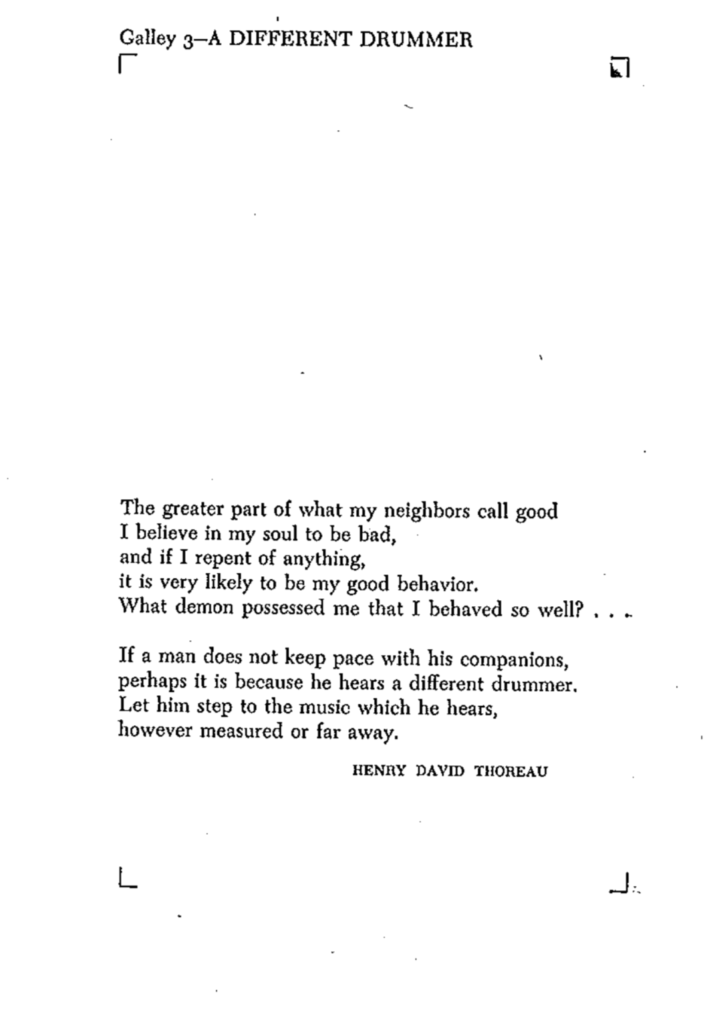Today’s theme song in ENGL 203-04 is “Different Drum,” written in 1965 by Michael Nesmith and performed most famously by Linda Ronstadt as lead singer of the Stone Poneys.
One of the most famous and most-often quoted passages in Walden, of course, is this one from paragraph 10 of “Conclusion”:
Why should we be in such desperate haste to succeed and in such desperate enterprises? If a man does not keep pace with his companions, perhaps it is because he hears a different drummer. Let him step to the music which he hears, however measured or far away.
Walden made the two-word phrase “different drummer” a common expression in English. But not right away. We can trace the rise of this word-pair (a “two-gram,” in data-speak) using Google’s Ngram Viewer, which shows us that in books written in English, the phrase begins to take off in the 1940’s and rises steeply in frequency between 1960 and 1980.
It was in the early 1940’s that interest in Thoreau really began to grow, an interest both reflected in and fueled by the scholars and enthusiasts who founded The Thoreau Society in 1941, led by Walter Harding, who in 1956 joined the English department at SUNY Geneseo. (An earlier, smaller uptick in the appearance of “different drummer” may have had something to do with the fact that, as Harding himself has written, Thoreau’s message of simplicity resonated with life during the Great Depression. See “Thoreau’s Reputation,” in The Cambridge Companion to Henry David Thoreau, ed. Joel Myerson, Cambridge University Press, 1995, p.8.) The big spike that starts in the early 60’s correlates with the rise of the civil rights movement and the anti-war movement as well as a youth culture that prized self-discovery, self-actualization, and a broad rejection of commercial values.
In 1962, the bicentennial year of Thoreau’s death, 24 year-old William Melvin Kelley published his first novel, A Different Drummer. As Kathryn Schulz has written in a recent profile of Kelley for The New Yorker magazine, the novel
promptly earned him comparisons to an impressive range of literary greats, from William Faulkner to Isaac Bashevis Singer to James Baldwin. It also got him talked about, together with the likes of Alvin Ailey and James Earl Jones, as among the most talented African-American artists of his generation.
Kelley’s novel opens “in a mythical state bounded by Alabama, Tennessee, Mississippi, and the Gulf of Mexico,” according to a review published in the Chicago Tribune on June 10, 1962. One of the state’s inhabitants, Tucker Caliban, “decides to listen to what Thoreau, in his ‘Walden,’ called a ‘different drummer,’ to heed the voice of his conscience and refuse to participate in a society based upon inequality.”
The review, written by SUNY Geneseo professor of English Walter Harding and published under the headline “A Rare First Novel: Dynamic, Imaginative, and Accomplished,” continues:
[Caliban] destroys his farm land with salt, burns his home, shoots his animals, and departs for a new life in the north. His action sparks a mass reaction by all the other Negroes in the state, who overnight abandontheir homes and join him on the trek northward.
As his epigraph, Kelley used two quotations from Thoreau’s Walden.

Kelley appreciated Harding’s enthusiastic review of his novel (Harding called it “gripping from the first page to the last”), and the two began a correspondence that eventually led to Kelley’s spending a semester — spring 1965 — as a visiting professor of English at Geneseo.
We might consider one final connection between Kelley and Thoreau. Schulz claims that Kelley is credited with the first printed use of the colloquialism woke as a synonym for a certain kind of self- and social awareness. The word appears in the title of Kelley’s May 20, 1962 op-ed in the New York Times on “Negro idiom” (linguists today call it “African American Vernacular English”): “If You’re Woke You Dig It.”
One can’t help but be reminded of how pervasively Thoreau himself uses the contrast between sleep and waking as a metaphor for awareness in Walden. The kind of awareness he has in mind varies depending on the context. Several different (if related) types of awareness are offered in rapid succession in paragraph 14 of “Where I Lived, and What I Lived For”: “intellectual exertion,” a “poetic or divine life,” attentiveness to Nature. But in the context of the meaning that woke has assumed in our present moment, one kind stands out. “Moral reform,” Thoreau writes in this paragraph, “is the effort to throw off sleep.”
It’s not hard to see why, for the epigraph to his own book, Thoreau plucked a sentence from paragraph 7 of “Where I Lived”: I do not propose to write an ode to dejection, but to brag as lustily as chanticleer in the morning, standing on his roost, if only to wake my neighbors up.
